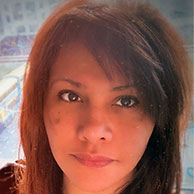Conversation with Insaf Ben Othmane and Cynthia Susilo
This session was separated into two parts where we welcome Insaf Ben Othmane from ŒCUMENE Studio and Cynthia Susilo from UN-Habitat.
Insaf is the founder of ŒCUMENE Studio and the co-founder of Placemaking MENA Platform. Her research interests revolve around architecture and urban development, urban resilience projects, integrated projects, and strategies. She has been working for over 10 years in MENA and Africa in the area of community development, urban governance, strategic planning, and urban technologies.
The most recent project of MENA is called LelKol project, which is an online incubation for five placemaking in the whole MENA. There are five ongoing projects, one in Jordan, two in Lebanon, one in Sudan, and a huge one in Alexandria, Egypt where online public lectures, debates, and tutors are conducted. Using collective intelligence by multidisciplinary stakeholders, they attempt to create social integration and tackle frictions and conflicts. Insaf understands placemaking processes to find many tools and strategies, not necessarily to bring something essential but to bring normality in the shared spaces through, for example, working with children using playscape, creating community gardens, and many more which help the people living under the same space to understand their commonalities, their roles within the said community, and build relationships. Insaf shared her insight about how shared space is essential in developing relationships between individual and community, and for the community to acknowledge individual freedom.
According to Insaf, the smaller the scale for placemaking, the easier it is to be understood by decision-makers. She also added that placemaking helps to understand what is the reality for the people in a qualitative way because people and their identities would be the center of the processes. Insaf acknowledged that bottom-up processes in community development would help the people within to understand and acquire knowledge, and opportunities, and help each other in the name of humanitarian values. Especially when the intersectionality of grassroots movements is applied.
Cynthia Susilo is an experienced researcher and lecturer in urbanisms, human settlements, architecture, built-environmental disciplines, and urban-rural policy and planning. She is a research professional in the area of built-environmental design and planning, ethnography, and community facilitator. She is working with Habitus Platform Initiative as Principal Researcher, Kampungnesia as Research Collaborator while working as the Strategic Advisor in UN-Habitat.
According to Cynthia, there are some internal and external conflicts even in the smaller scope and are perceived as less conflicted when compared to issues faced by refugees. Some main concerns according to UN-Habitat are: (1) How bringing refugees and internally displaced people (IDPs) to new locations and new situations could reduce the sense of their past traumas, (2) Considering the variety of legal status of IDPs and refugees, the level of preparedness for cities everywhere to host refugees, migrants, or internally displaced people should be valued in their ways to find the best methods to help and accept these vulnerable groups to be able to get better assistance, feel social cohesion, feel equality within the new locations they are entering.
Cynthia acknowledged the city’s role as a mediator between the city and refugees and also between refugees’ communities especially due to existing frictions. In most cases, humanitarian values should be put first regardless of the legal status of refugees, migrants, or IDPs. She also acknowledged that people should be central to the movements because without knowing what actually these people who are relocated feel, it will be very difficult to support the initiative in a way that’s feasible for the people. The use of bottom-up initiatives should be emphasized to get bottom-link initiatives to willingly open up and share perspectives. It is important to note that refugees have their own capacities and opportunities and that each community has its own customs, cultures, approaches, and needs to best facilitate and protect them. Especially when considering their past traumas and current challenges.
Any comments or suggestions? Send it to us in written or audio format here, Instagram @rdiuref, or email to info@rdiuref.org





 Insaf is a Tunisian architect, urban development strategist, and researcher. Working for over ten years internationally in the area of community development, urban governance and strategic planning, and urban technologies in MENA and Africa.
Insaf is a Tunisian architect, urban development strategist, and researcher. Working for over ten years internationally in the area of community development, urban governance and strategic planning, and urban technologies in MENA and Africa. Cynthia Susilo is an experienced researcher and lecturer in urbanism, human settlements, architecture, built-environmental disciplines, and urban-rural policy and planning.
Cynthia Susilo is an experienced researcher and lecturer in urbanism, human settlements, architecture, built-environmental disciplines, and urban-rural policy and planning.